The Minister of Justice and the President of Ain Shams University open the conference on challenges and legal and economic prospects for artificial intelligence
Advisor Omar Marwan, Minister of Justice, Prof. Mohamed Diaa, President of Ain Shams University, open the activities of the Faculty of Law’s annual conference entitled Legal and Economic Challenges and Prospects for Artificial Intelligence, in the presence of Prof. Ghada Farouk, Vice President of the University for Community Service and Environmental Development Affairs, Prof. Muhammad Safi, Dean of the Faculty of Law, Prof. Omar Al-Husseini, Dean of the Faculty of Engineering, Prof. Yassin Al-Shazly, Vice Dean of the Faculty for Graduate Studies and Research, Prof. Muhammad Al-Shafi’i, Vice Dean of the Faculty for Education and Student Affairs, Prof. Ahmed Dahoum, Vice Dean of the Faculty for Community Service and Environmental Development Affairs, Prof. Guido Westkamp, Academic Director of the Master's Program in Intellectual Property, Queen Mary University, Mr. Alfonso Verdo Pérez, President of the International Committee of the Red Cross, Mr. Alex Ivanko, Chairman of Working Group IV of the United Nations Commission on International Trade Law (UNCITRAL), Prof. Catalin Ligeti, Vice-President of the International Association of Criminal Law, AIDP, Dean of the Faculty of Law, Economics and Finance, at the University of Luxembourg.
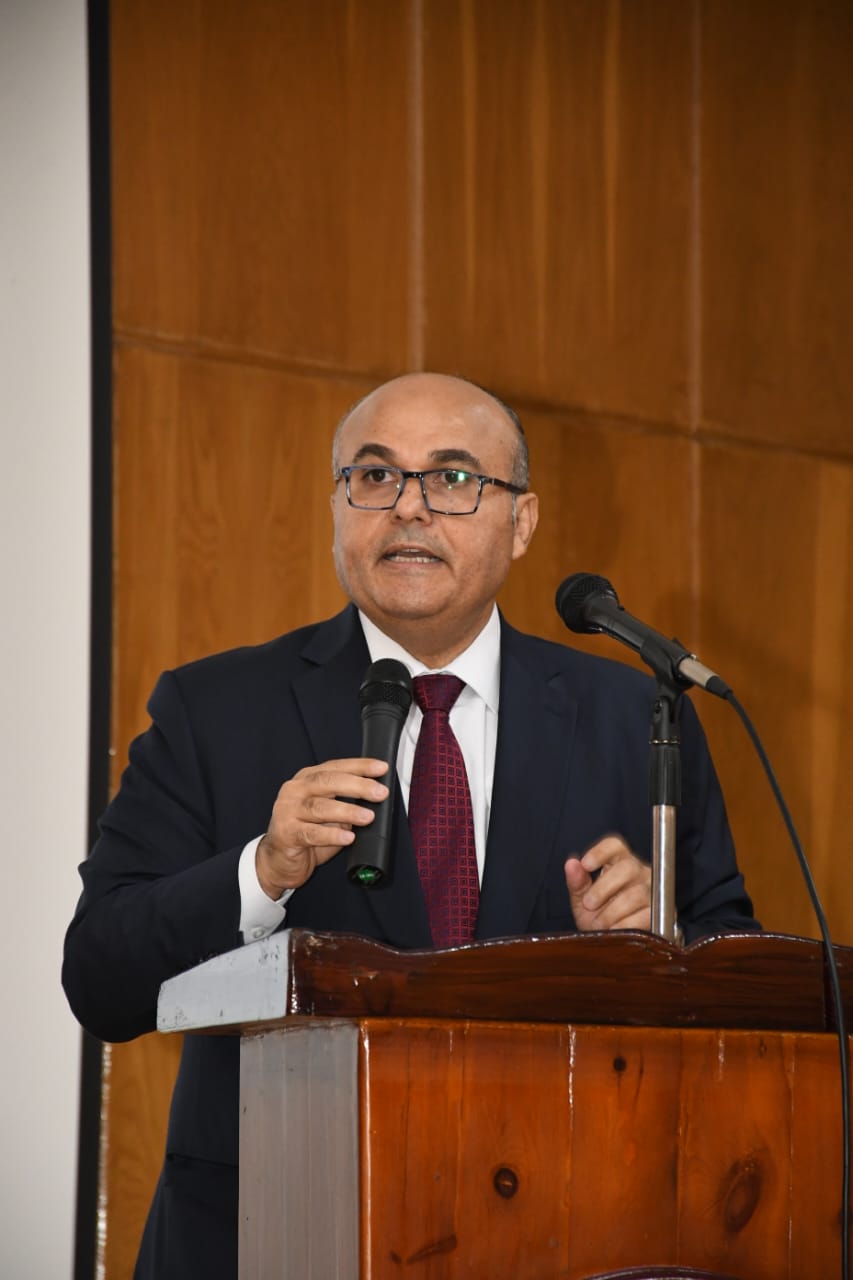 |
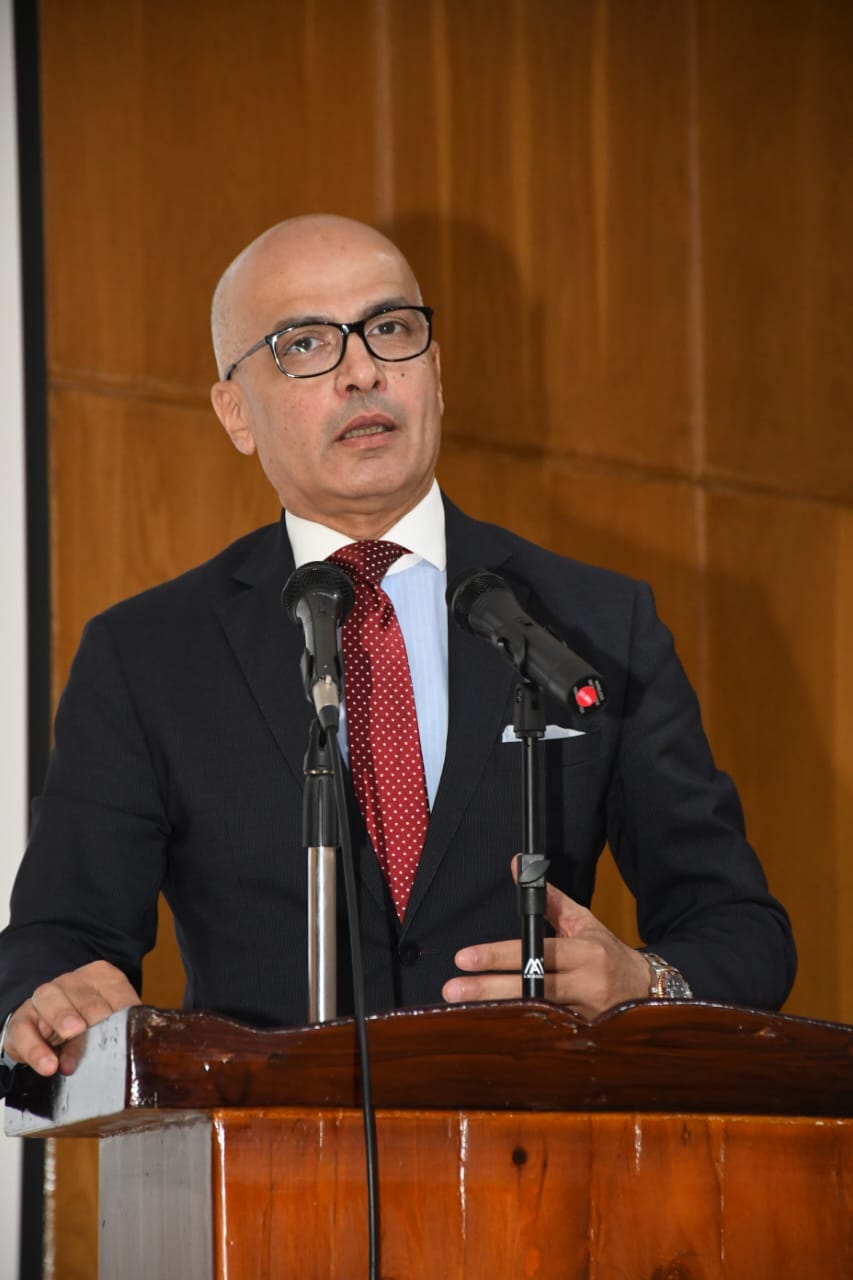 |
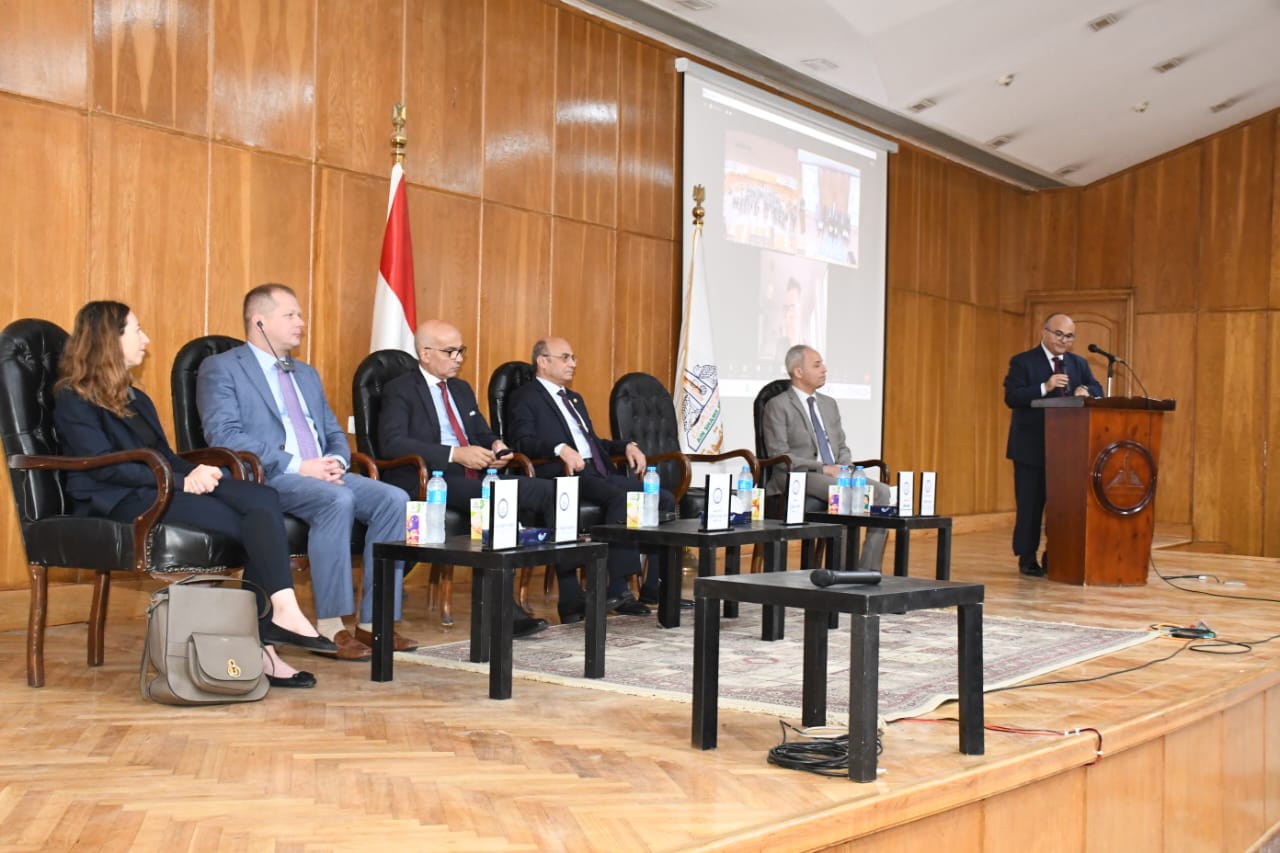 |
||
During his speech, Advisor Omar Marwan, Minister of Justice, extended his sincere congratulations to Prof. Mohamed Diaa Zein El Abidine on the occasion of the issuance of the republican decision appointing him as President of the prestigious Ain Shams University, wishing him and the university further success and progress. He also expressed his happiness at being at the Faculty of Law, which through its eminent professors contributed to forming the largest part of his legal academic training, where he studied during the first university stage, and was appointed, for academic excellence, as a teaching assistant at the faculty, before moving on to judicial work.
Noting that the conference sessions address multiple subtopics that address the relationship of artificial intelligence to the protection of innovation, its effects in the fields of human rights, criminal law, and humanitarian international law, and the responsibility for using its advanced technologies will produce important results and recommendations, expressing his aspiration to include it in a final report on the conference to be sent to various relevant authorities in the country.
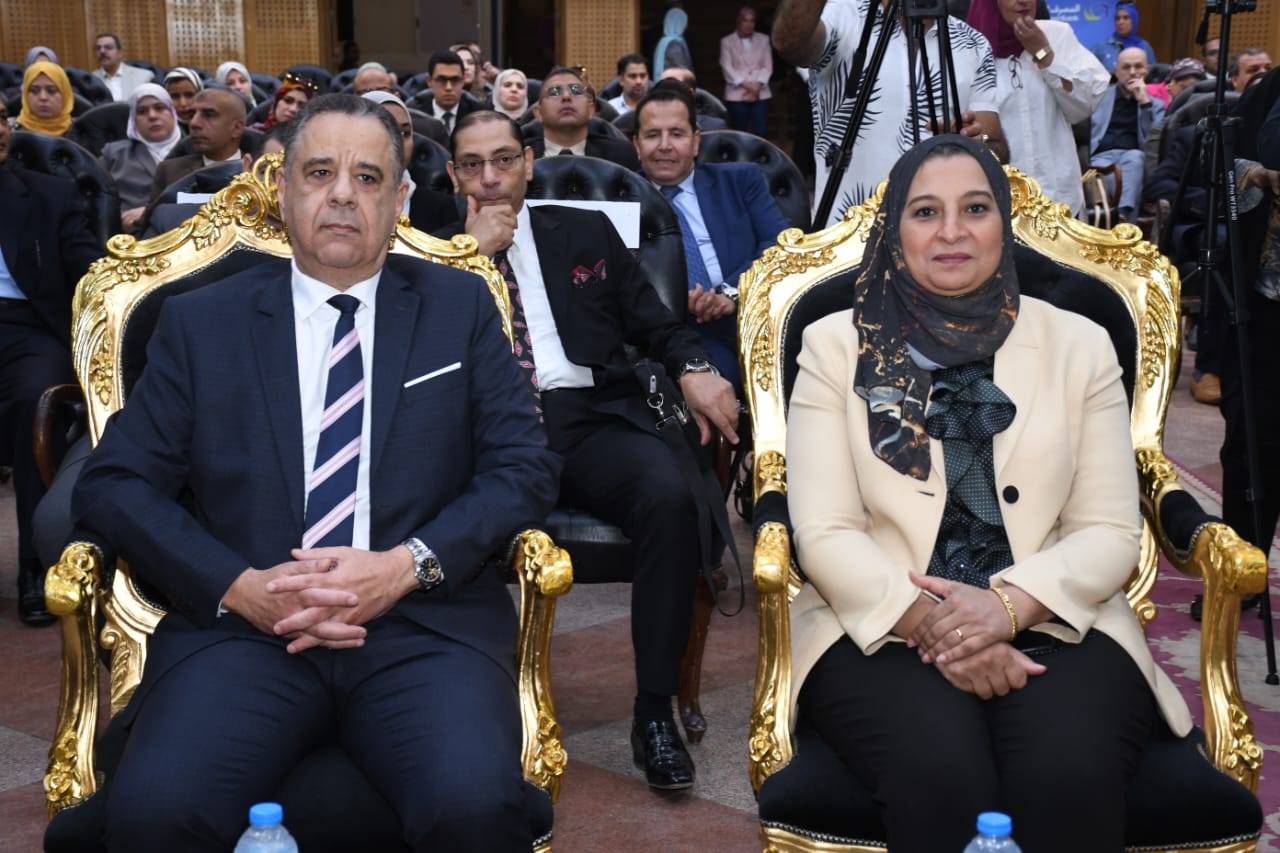 |
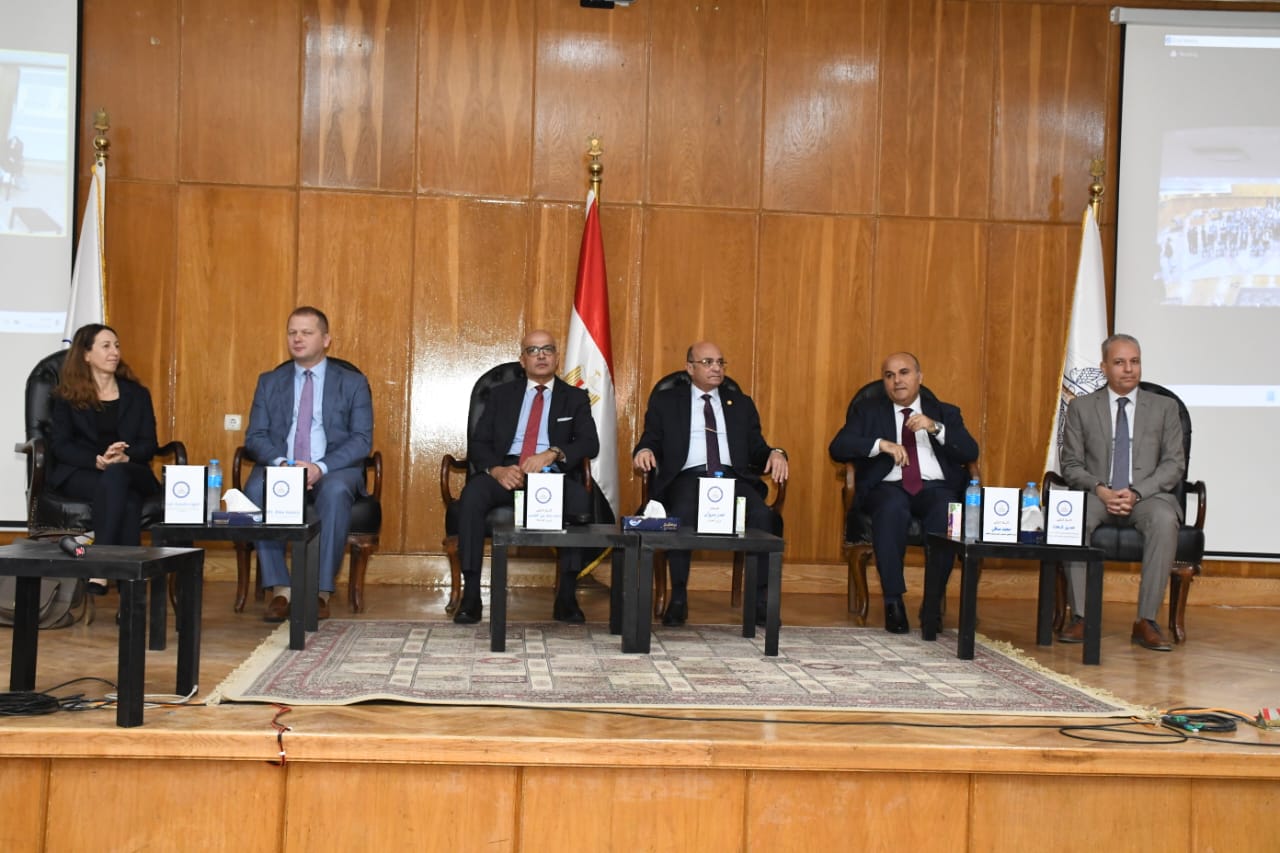 |
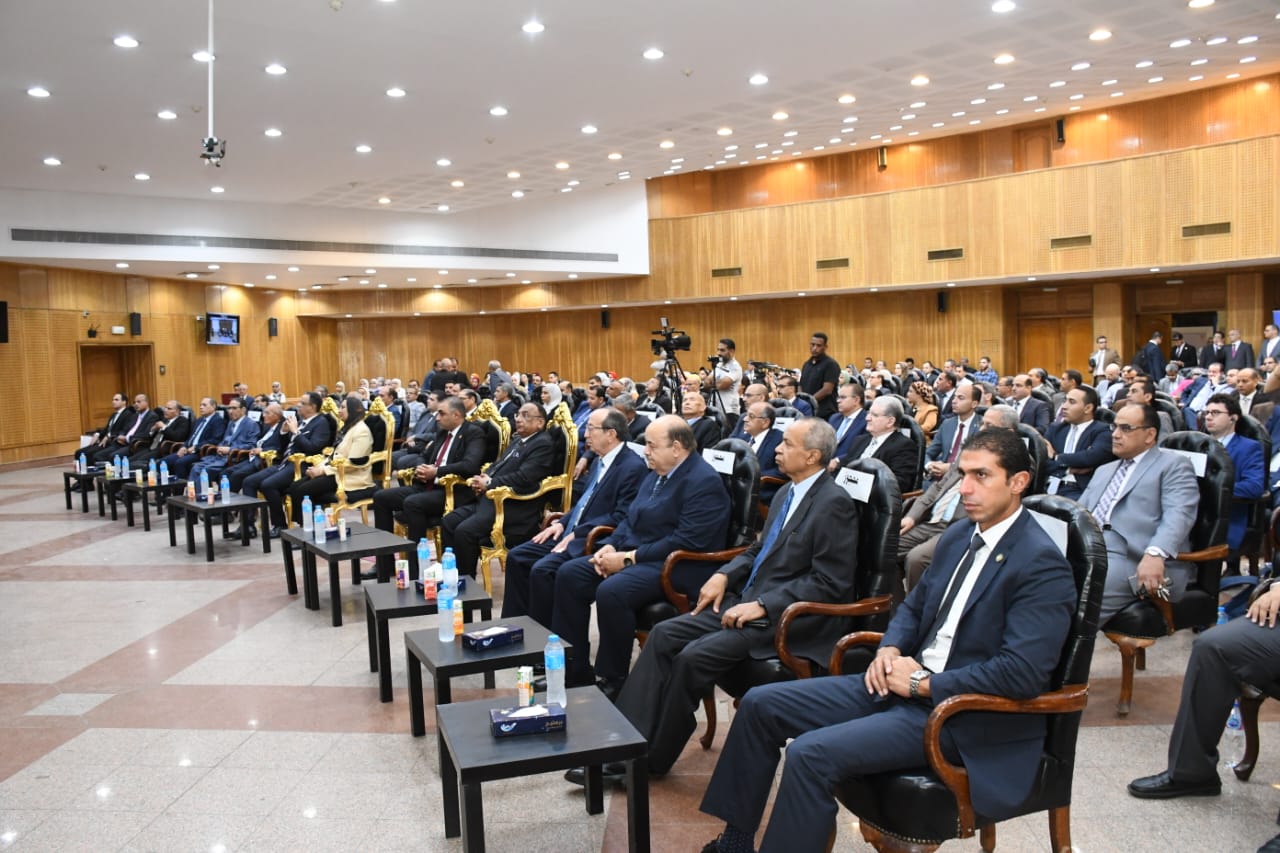 |
||
His Excellency pointed out that the role played by the Faculty of Law, at Ain Shams University, is one of the roles assigned to universities by providing applied scientific research.
Adding that scientific research is one of the most important issues that the Egyptian state cares about and that crosses over into the new republic, this is a republic that appreciates and cares about scientific research and scientists. He continued: Work will be done to prepare an integrated draft law to confront the challenges of artificial intelligence. He also asked the Faculty of Law to nominate a faculty staff at the Faculty of Law at Ain Shams University to participate in preparing the draft law.
The Minister of Justice confirmed that the Ministry is working on a plan to use artificial intelligence in work methods and tools in a way that will keep pace with the times reflect on the quality of work and achieve citizen comfort, within the framework of the prospects for digitization and governance that have been achieved in the new republic and the new administrative capital.
He added that President Abdel Fattah El-Sisi cares about science and values scientists, and this is one of the most important characteristics of the new republic.
In his speech, Prof. Muhammad Diaa, President of the University, expressed his happiness at his presence at the Faculty of Law conference, extending his thanks and appreciation to all the previous university leaders, led by Prof. Mahmoud El-Meteini, the former University President, for their sincere efforts and their keenness to support and stimulate the educational process and the development of the university and its employees in various fields.
He pointed out that this year’s Faculty of Law conference comes with rich participation from various local and international bodies in the presence of researchers from the University of Lyon in France, Queen Mary University in England, the University of Sharjah in the United Arab Emirates, the International Penal Law Society, the United Nations Commission on International Trade Law, the International Committee of the Red Cross, and various Egyptian universities, he explained that the conference coincides with the issuance of the guideline for controls on the use of artificial intelligence in higher education and scientific research last October, which comes in light of the directives of the Egyptian state related to the ethical and responsible use of artificial intelligence applications and the Egyptian state authorities in the field of education and scientific research.
He stressed that the technological revolution, especially in the field of communications and information, is the most important development that the world is experiencing today, and is undoubtedly considered the primary driver of many of the events of our daily lives.
She explained that just as industrial wealth and the transition to machinery were a milestone in the history of humanity, it brought with it prosperity and wealth to some peoples, but its fruits were limited to developed countries and did not benefit all of humanity, and it also had devastating consequences on large numbers of the population Therefore, as we live today in the midst of another technological revolution, the lessons of the past can help us face the present better.
He explained that the emergence of artificial intelligence and the new tools for communication, many fields of work and creativity, and unique services in various aspects of life were a result of the great technological development, without any known limits or concrete rules. This development has also been accompanied by many negative aspects that may affect the values and ethics of society and even its security, as generative artificial intelligence has allowed the use of data to create new content similar to what humans produce, such as ChatGypt, which may constitute fraud on intellectual property rights and a violation of academic integrity, his Excellency also drew attention to the fact that there are serious concerns about the great acceleration in the development of treatment and diagnosis systems using artificial intelligence and the challenges it may pose regarding the concept of body safety and defining the framework of medical responsibility.
This development may also lead to a decline in the number of jobs, average per capita income, and massive economic inequality. In addition, the growing use of artificial intelligence in the manufacture of military weapons will inevitably lead to a radical change in the form of armed conflicts and the established principles of international humanitarian law and international criminal law.
Prof. Muhammad Diaa pointed out that the world of crime is not isolated from these important technological transformations that the world is witnessing in the field of artificial intelligence. Rather, it can be said that organized crime groups sometimes take the lead in exploiting technological transformations by inventing criminal patterns that require great effort and advanced techniques to confront them and ward off their dangers to humanity, this makes it imperative that law enforcement officials be able to successfully confront the plans of these criminal groups.
His Excellency concluded his speech by saying that preserving society from the evils of these criminals and preserving the security of society, its members, and the safety of their property, cannot be achieved, of course, except through preparing the required preparation of jurists and enhancing their experience and scientific and applied qualifications. He stressed that the process of construction, preparation, and rehabilitation is not easy, but we are all confident that the Faculty of Law and its ancient history, bright present, and bright future are capable of qualifying these cadres and also effective community participation to address these challenges and contribute to establishing appropriate legislative frameworks in cooperation with all the state’s legislative, executive and judicial institutions. In order to ensure the safe and fair use of artificial intelligence applications.
In his speech, Prof. Muhammad Safi, Dean of the Faculty of Law, welcomed the audience, noting that the faculty’s annual conference, titled “Legal and Economic Challenges and Prospects for Artificial Intelligence,” comes from fulfilling its role in the field of applied scientific research aimed at proposing realistic solutions to practical societal issues, especially the enormous problems, and challenges resulting from the use of "artificial intelligence", which has rightly become a topic of concern to the entire international community, especially developing countries.
He explained that the conference will discuss, over two days, a selected group of studies, research, and working papers distributed over seven sessions in addition to the opening session, which presents issues related to artificial intelligence contracts, mechanisms for protecting innovation, and the effects of using artificial intelligence technologies in the areas of criminal law, international humanitarian law or the law of armed conflicts and economic fields with their multiple aspects, which include trade, investment, money, and cash, and the repercussions of all of this on respect for human rights and basic freedoms, including his right to hold legal positions. The sessions conclude with a discussion of the topic of civil and criminal liability for the use of artificial intelligence between the provisions of Sharia and law.
He pointed out that the conference’s activities will produce results and recommendations that we are working on formulating and communicating to the various state and private sector agencies concerned with them to benefit from them, and this is part of the faculty’s inherent role in serving the community.
The two-day conference aims to shed light on the social and economic dimensions of artificial intelligence and demonstrate the role of international and internal legal rules and regulatory bodies in regulating its various fields.
It is worth noting that the conference discusses several topics, including the legal and legal responsibility resulting from the use of artificial intelligence, the legal and legal provisions for transactions using artificial intelligence applications, the economic aspects of artificial intelligence activities, the effects of artificial intelligence on the justice system, in addition to the ethical dimension of artificial intelligence practices.
.svg)




